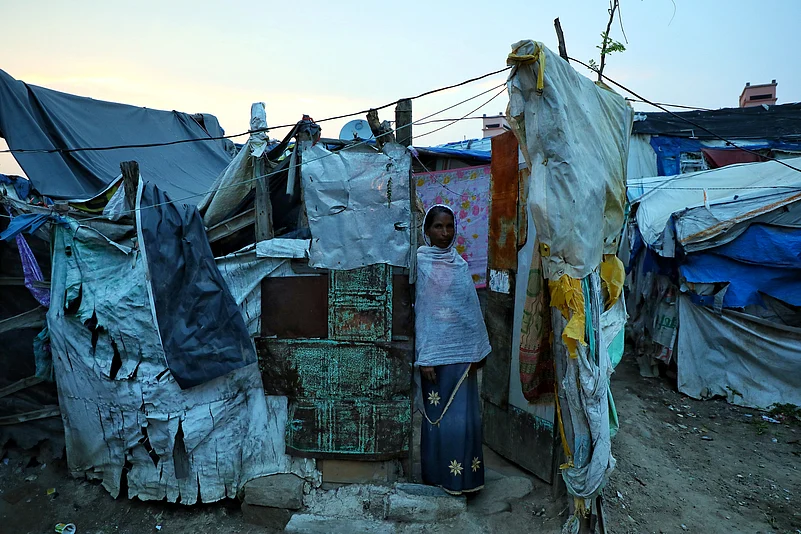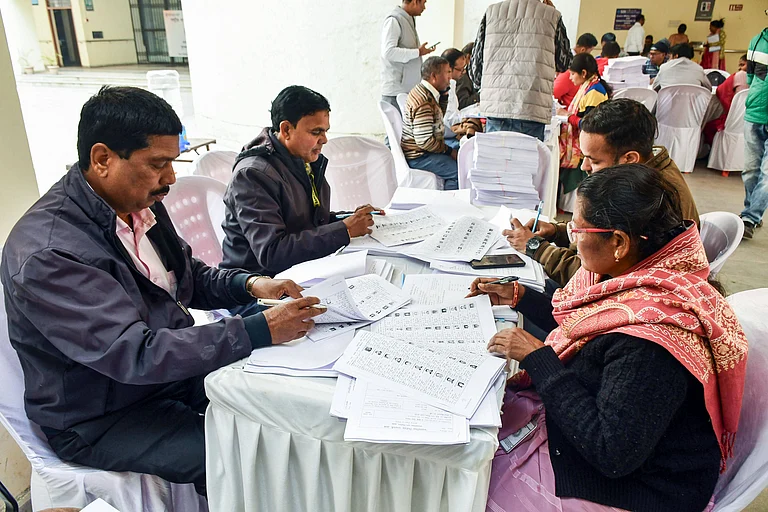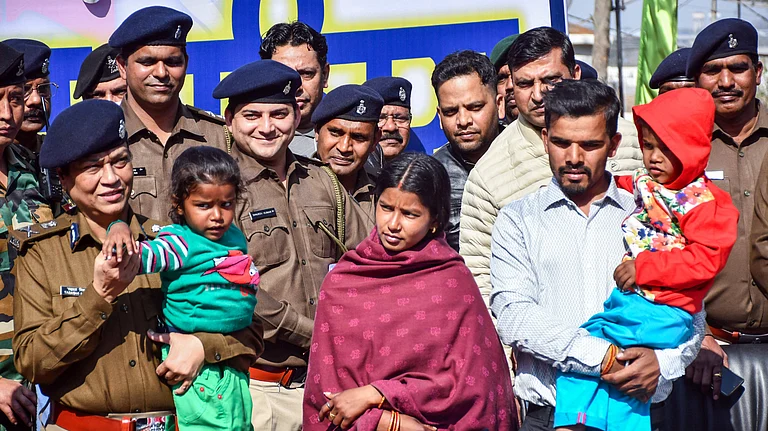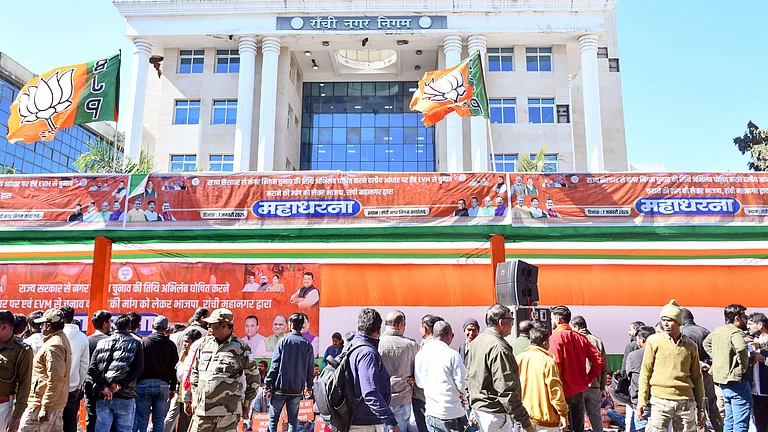Torn flexes tied to bamboo poles, cheap tarpaulin sheets spread over the structure – doubling as the roof – and some lost memories of ‘good old times’ together make what Mohd Razak calls ‘home’. As the heat of May Sun climbs up, he pulls out one of the chairs and sits in the foyer for hours waiting for the evening breeze that his city is known for. Situated at the centre of Ranchi, his ‘home’ in Islamnagar is not another slum among hundreds, it is a space where once the memories have got perished, livelihoods were lost and hopes crumbled.
It was early morning of April 6, 2011, when bulldozers of Ranchi Municipality demolished houses of at least 1,200 people in Islamnagar. The bulldozer continued its parade unless it received the stay order from the Supreme Court. But by then most of the land was ‘cleared’ and the remanent was scattered utensils, broken tables, dust, debris and bodies of two young residents – Guddu and Golden.
As this demolition drive ensued a political storm and all the political parties threw their hats into the ring to woo their respective political constituencies, the legal battle for rehabilitation started in Jharkhand High Court. Addressing the concerns of the people, then Chief Justice Bhagwati Prasad in his verdict on May 12, 2011, directed the government to give flats to the ‘verified’ residents who have been staying here for more than 10 years. He also gave them a timeline of 13 months within which the flats had to be distributed.
However, it has been 13 years and not a single ‘verified’ person has got the key. Some of them would still cast their votes hoping that someday, their elected representative would do something for them.

Ranchi is going to polls on May 25, the sixth phase of Lok Sabha elections. Though the demolition drive was one of the major political issues in the state during 2011-12, gradually it has lost its relevance and now, neither the BJP nor Congress seems to have much interest in it. This time, the Congress has fielded a young woman leader Yashwashini Sahay from the constituency against the BJP’s sitting MP Sanjay Seth.
Sahay, daughter of senior Congress leader and former Union Minister Subodhkanti Sahay, has not visited the place yet but her father still recalls how he was almost shot at during the protests against the eviction. “I was there on the day of eviction and when the police fired bullets, I was barely saved,” says Sahay. On being asked why the political parties are maintaining silence on the issue, he says, “I picked up the issue again last December and had a plan to discuss it with Hemant Soren after January 26 but within days he was arrested.” Notably, during the eviction drive in 2011, BJP’s Arjun Munda was the CM of the state and Soren was his deputy. The saffron party, however, has had a contested relationship with Islamnagar since the very beginning of the controversy.
It was after the 1967 communal riots in Ranchi (when it was still part of Bihar) that Muslims from different parts of the city escaped their localities and settled on the vacant land that was owned by a polytechnic college. Back then, this place was known by the name of Kachdapada, literally meaning ‘dirty locality’.
In the 1980s, one Maulana took the initiative to change the name and ran a reform movement. However, in the 1990s, this region came into the focus of BJP-RSS. On January 30, 1993, one Vinay Pathak wrote an article in RSS mouthpiece Panchajanya titled Bas gaya ‘Islam’nagar.
The undue emphasis on ‘Islam’ in the post-Babri days was intended to give it a communal angle, says Mohd Shakeel who fought the legal battle to ensure rehabilitation of the evicted residents. In the article, Pathak called the residents ‘Bangladeshi intruders’ and said that the then Bihar CM, Lalu Prasad Yadav, was settling them to gain political mileage. According to the media reports, Yadav was keen to offer them the status of a permanent settlement.
Later in 2015, after four years of the HC verdict when no progress was made and Shakeel again knocked on the doors of the judiciary, it was decided that they would be rehabilitated to Madhukam, a Hindu-dominated area. On January 29, BJP leader and current MLA C P Singh came out on the streets with thousands of people and said that they would not let intruders settle in a ‘Hindu locality’.
This led to the fresh submission by Shakeel who, citing grounds like security of the people, asked the HC to direct the government to provide them flats at the same place from where they had been evicted. As the court agreed to the demand and allocated 6.9 acres of land for the project, the government recruited JUDCO and allotted Rs. 33 crores. The plan was to give flats to 444 ‘verified’ families. “However, they are constructing 291 flats in the first stage and it would be followed by the construction of the remaining 153 flats,” says Shakeel.

In the following years, however, the plans of providing free rehabilitation suddenly got changed and it was brought under Pradhan Mantri Awas Yojana (PMAY). The ‘verified’ families were asked to give Rs.50,000 to get a single-room flat. “We sold whatever little we had and paid the money but even then, we didn’t receive it,” says Riyaz Ansari who works in a nearby printing press.
As Ansari talks about his fate sitting at his jhuggi made of flex and tarpaulin sheet, a passerby cranes in his neck: “Earlier we had everything. Our houses were made of brick and mortar. We had water connection. We had a park for the children. But things changed in seconds. They bulldozed my dreams in front of my eyes.”
Islamnagar had been ‘adopted’ by Jharkhand Rajya Sabha MP Parimal Nathvani who from his MPLAD money installed a 1 lakh litre water tank, and made a park for the children. However, everything was destroyed by the bulldozer, laments Shakeel. Now, Islamnagar has only one tube well from where they draw water. “Not even a single water tank comes here and when we go to our councillor, she tells us that we are not eligible for municipality facilities due to our ‘illegal status’,” says Jahanara Khatun, a woman in her mid-40s.
During the monsoon, the lowland gets flooded and people stay awake throughout the night to avoid any accidents. “As you can see, the roofs are made of flexes and it can’t survive a slight storm,” says Mohd Muslin who had been allotted a flat in the first phase but hasn’t received the key yet.
The tall towers that consist of one-room and two-room sets have almost remained unchanged for the last few years. In 2021-22 when this reporter visited the place, constructions were almost done. The councillor Nazma Raza even promised that they would get the flats soon. But in these years, they only painted it, says another resident. And the silence over Islamnagar during election time further irritates them. “There is no point in voting for anyone. Our fate is not going to change at all,” says Razak. However, Ansari, intervenes, “Still we have to vote and we have no other choice but Congress. Even after knowing that nothing will happen, we survive by the hope of a better future.”

Looking at the under-construction flats, Mohd Shaqib, a rickshaw puller, says, “Our dreams are glued to it. A few months back, they told us that the flats would be delivered soon. We believed in their words and didn’t even buy a new flex to cover the roof.” A flex approximately costs Rs. 1,500.
Mohd Shakeel, however, says that he would further strengthen the movement as the elections get over. On the other hand, Sahay also promises to bring up the matter with the government after the results are out. However, the lights of hope get dimmer with the time. Sitting in his makeshift courtyard, 70-year-old Mohd Yasin, says,
“Mili Khak me mohabbat, jala dil ka ashiyana,
Mein Kahan rahoon chaman me, mera lut gaya thikana..”




























